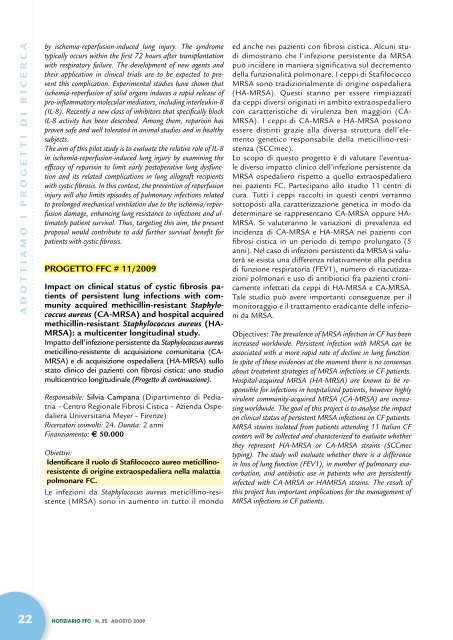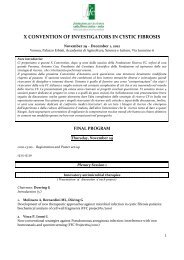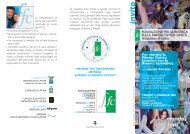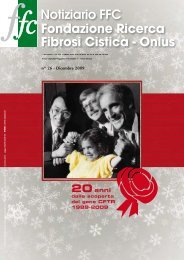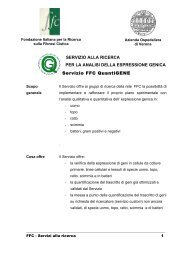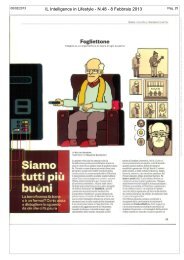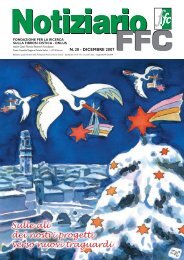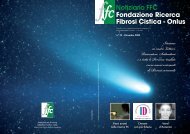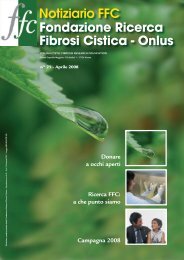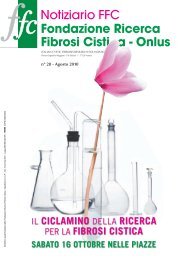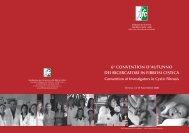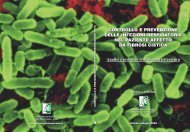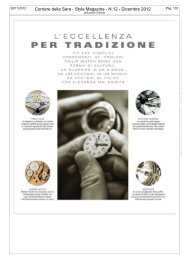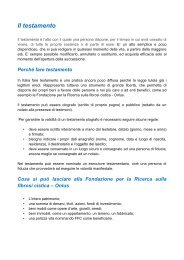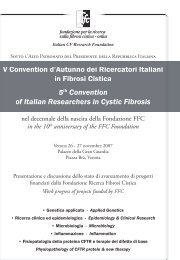Notiziario n. 25 - Fondazione Ricerca Fibrosi Cistica
Notiziario n. 25 - Fondazione Ricerca Fibrosi Cistica
Notiziario n. 25 - Fondazione Ricerca Fibrosi Cistica
Create successful ePaper yourself
Turn your PDF publications into a flip-book with our unique Google optimized e-Paper software.
ADOTTIAMO I PROGETTI DI RICERCA<br />
by ischemia-reperfusion-induced lung injury. The syndrome<br />
typically occurs within the first 72 hours after transplantation<br />
with respiratory failure. The development of new agents and<br />
their application in clinical trials are to be expected to prevent<br />
this complication. Experimental studies have shown that<br />
ischemia-reperfusion of solid organs induces a rapid release of<br />
pro-inflammatory molecular mediators, including interleukin-8<br />
(IL-8). Recently a new class of inhibitors that specifically block<br />
IL-8 activity has been described. Among them, reparixin has<br />
proven safe and well tolerated in animal studies and in healthy<br />
subjects.<br />
The aim of this pilot study is to evaluate the relative role of IL-8<br />
in ischemia-reperfusion-induced lung injury by examining the<br />
efficacy of reparixin to limit early postoperative lung dysfunction<br />
and its related complications in lung allograft recipients<br />
with cystic fibrosis. In this context, the prevention of reperfusion<br />
injury will also limits episodes of pulmonary infections related<br />
to prolonged mechanical ventilation due to the ischemia/reperfusion<br />
damage, enhancing lung resistance to infections and ultimately<br />
patient survival. Thus, targeting this aim, the present<br />
proposal would contribute to add further survival benefit for<br />
patients with cystic fibrosis.<br />
Progetto FFC # 11/2009<br />
Impact on clinical status of cystic fibrosis patients<br />
of persistent lung infections with community<br />
acquired methicillin-resistant Staphylococcus<br />
aureus (CA-MRSA) and hospital acquired<br />
methicillin-resistant Staphylococcus aureus (HA-<br />
MRSA): a multicenter longitudinal study.<br />
Impatto dell’infezione persistente da Staphylococcus aureus<br />
meticillino-resistente di acquisizione comunitaria (CA-<br />
MRSA) e di acquisizione ospedaliera (HA-MRSA) sullo<br />
stato clinico dei pazienti con fibrosi cistica: uno studio<br />
multicentrico longitudinale (Progetto di continuazione).<br />
Responsabile: Silvia Campana (Dipartimento di Pediatria<br />
– Centro Regionale <strong>Fibrosi</strong> <strong>Cistica</strong> – Azienda Ospedaliera<br />
Universitaria Meyer – Firenze)<br />
<strong>Ricerca</strong>tori coinvolti: 24. Durata: 2 anni<br />
Finanziamento: € 50.000<br />
Obiettivi:<br />
Identificare il ruolo di Stafilococco aureo meticillinoresistente<br />
di origine extraospedaliera nella malattia<br />
polmonare FC.<br />
Le infezioni da Staphylococus aureus meticillino-resistente<br />
(MRSA) sono in aumento in tutto il mondo<br />
ed anche nei pazienti con fibrosi cistica. Alcuni studi<br />
dimostrano che l’infezione persistente da MRSA<br />
può incidere in maniera significativa sul decremento<br />
della funzionalità polmonare. I ceppi di Stafilococco<br />
MRSA sono tradizionalmente di origine ospedaliera<br />
(HA-MRSA). Questi stanno per essere rimpiazzati<br />
da ceppi diversi originati in ambito extraospedaliero<br />
con caratteristiche di virulenza ben maggiori (CA-<br />
MRSA). I ceppi di CA-MRSA e HA-MRSA possono<br />
essere distinti grazie alla diversa struttura dell’elemento<br />
genetico responsabile della meticillino-resistenza<br />
(SCCmec).<br />
Lo scopo di questo progetto è di valutare l’eventuale<br />
diverso impatto clinico dell’infezione persistente da<br />
MRSA ospedaliero rispetto a quello extraospedaliero<br />
nei pazienti FC. Partecipano allo studio 11 centri di<br />
cura. Tutti i ceppi raccolti in questi centri verranno<br />
sottoposti alla caratterizzazione genetica in modo da<br />
determinare se rappresentano CA-MRSA oppure HA-<br />
MRSA. Si valuteranno le variazioni di prevalenza ed<br />
incidenza di CA-MRSA e HA-MRSA nei pazienti con<br />
fibrosi cistica in un periodo di tempo prolungato (5<br />
anni). Nel caso di infezioni persistenti da MRSA si valuterà<br />
se esista una differenza relativamente alla perdita<br />
di funzione respiratoria (FEV1), numero di riacutizzazioni<br />
polmonari e uso di antibiotici fra pazienti cronicamente<br />
infettati da ceppi di HA-MRSA e CA-MRSA.<br />
Tale studio può avere importanti conseguenze per il<br />
monitoraggio e il trattamento eradicante delle infezioni<br />
da MRSA.<br />
Objectives: The prevalence of MRSA infection in CF has been<br />
increased worldwide. Persistent infection with MRSA can be<br />
associated with a more rapid rate of decline in lung function.<br />
In spite of these evidences at the moment there is no consensus<br />
about treatment strategies of MRSA infections in CF patients.<br />
Hospital-acquired MRSA (HA-MRSA) are known to be responsible<br />
for infections in hospitalized patients, however highly<br />
virulent community-acquired MRSA (CA-MRSA) are increasing<br />
worldwide. The goal of this project is to analyse the impact<br />
on clinical status of persistent MRSA infections on CF patients.<br />
MRSA strains isolated from patients attending 11 Italian CF<br />
centers will be collected and characterized to evaluate whether<br />
they represent HA-MRSA or CA-MRSA strains (SCCmec<br />
typing). The study will evaluate whether there is a difference<br />
in loss of lung function (FEV1), in number of pulmonary exacerbation,<br />
and antibiotic use in patients who are persistently<br />
infected with CA-MRSA or HAMRSA strains. The result of<br />
this project has important implications for the management of<br />
MRSA infections in CF patients.<br />
22 NOTIZIARIO FFC • N. <strong>25</strong> • AGOSTO 2009


